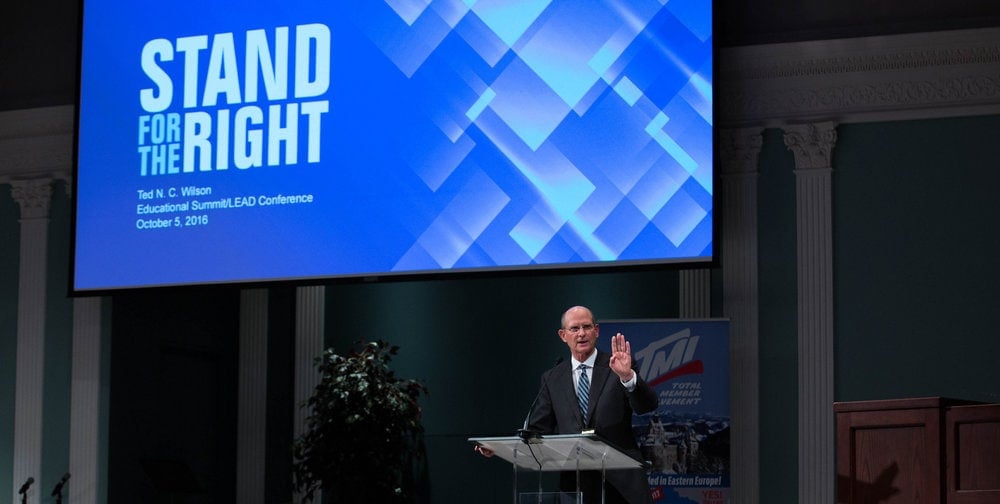
Church leaders from around the world are welcoming a special conference on Seventh-day Adventist education that is placing a renewed emphasis on the Bible and the writings of church cofounder Ellen G. White at a time of growing secularism.
Adventist Church president Ted N.C. Wilson urged leaders gathered for the three-day LEAD conference at the church’s headquarters in Silver Spring, Maryland, to “Stand for the Right” in leading the institutions under their charge.
Wilson said Adventist education played a key role in fulfilling the church’s mission to spread the gospel to the world.
“Seventh-day Adventist education is critical to the future mission of this church,” he told a packed auditorium at the opening of the conference Wednesday evening. “Never before has there been so much at stake for Adventist education.”
Following the speech, response was immediate and affirmative. Erton Köhler, president of the South American Division, which includes some of the denomination’s largest universities, agreed with a call by Wilson for leaders to be vigilant in protecting the unique mission of Adventist education.
“I think Elder Wilson is doing his function to defend our education system,” Köhler said. “Our vision is similar in the South American Division: We are trying to protect our education from secular influences. … I think he is on the right path.”
Köhler said he hoped the young educational leadership team in his division would receive guidance in keeping Adventist education on that proper course.
“We are working together with the church, but we are feeling pressures from society, from the government, and from secularization,” he said. “My perception is that the LEAD conference needs to guide us to come back to the way of the church. We need to rediscover our roots here, and that will be very important for our leadership.”
Read also: Adventist Education Declared Worthy of Becoming Fundamental Belief No. 29
Other leaders also kept an eye toward the future in expressing hopes for the conference and its focus on educational leadership.
“I hope it will solidify for all of us leaders — many of us who are board chairmen — the importance of this, so we don’t relegate it to a kind of second-tier ministry,” said Robert S. Folkenberg Jr., president of the Chinese Union Mission, who serves as board chair of the Chinese Adventist Seminary, Hong Kong Adventist College, and Hong Kong Adventist Academy. “It should be a first-tier ministry. I’m hoping it will revive that and refocus us.”
Folkenberg said Wilson’s remarks were “right on the money” when he linked Adventist education to the church’s mission.
“I really believe that Christian education is integral to our mission, not only in the present, but into the future, in terms of training leadership,” he said.
Ricardo Graham, president of the North American Division’s Pacific Union Conference, said Wilson’s message “was very pointed, to standing up for Christian education around the world.”
“Elder Wilson values the Bible as primary and the Spirit of Prophecy as secondary, as a source of direction for our educational system,” he said. Ellen White’s writings are commonly referred to as the Spirit of Prophecy.
Graham said the combination of Wilson’s speech and a conference presentation by Adventist educator and author George R. Knight would leave an impression on attendees.
“I think you have leaders here who will resonate with Elder Wilson’s speech, and George Knight is a very, very good speaker,” he said. “He connects very, very well with a multiplicity of people.”
Larry Blackmer, the North American Division’s vice president for education, said he hoped the LEAD conference would unite religious and teaching work.
“LEAD is trying to help administrators re-engage and join the ecclesiastical and education functions into one mission,” Blackmer said.
Responding to Wilson’s remarks, he said, “I believe he has the church’s educational system in his heart and is doing his best to promote Adventist education and keep our institutions distinctly Adventist.”
Christine Burt, a lay executive committee member from the Trans-European Division, predicted that societal challenges Adventists are facing in Britain would spread soon.
“It would be good if we could get a general focus together” regarding Adventist education, Burt said. “Every country doesn’t have the issues [of secularization] we have in Britain, but they are coming, whether we are ready or not.”
David C. Spencer, president of the Southern Africa Union, said he hoped for a “new push” on education from the LEAD conference. But he said he was anxious to see the church place a renewed emphasis on youth development and not merely maintain existing educational systems.
“Resources spent on children will give more bang for the buck than money spent on maintaining systems or structures,” he said.